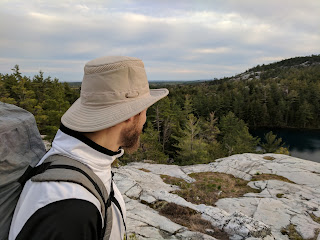Major life events change you.
I’m not sure if this is a controversial statement or not but I get the sense that many people don’t want to believe it. Many people are uncomfortable with the idea that you can’t always be 100% in control of your identity. Many people think that you can always choose who you are, what you believe, the communities you can exist in. I think I used to believe that – I can’t remember exactly – but if I did, I don’t anymore.
There are limitations to most of the major academic grief theories, as I go into here, but one thing they almost invariably include are final stages where you accept the new person that you’ve become after a loss. I don’t believe this should be characterized as “moving on”, but as incorporating the pain and the memories into a new identity that allows you to function. I agree with these theories – I don’t believe it’s healthy, or in the end possible, to keep pretending that you are the same person and living as such.
I understand the desire to have full control over who we are. It’s scary to believe that a random event can happen and all of a sudden you might actually be a different person. But at the same time, it should be pretty intuitive that events in your life change you. We all probably agree that we would not think the same way, or have the same job, or have the same worldview if we were born into a completely different culture. Sure, genetics are involved in that, but North Koreans and South Koreans have the same genes and live completely different lives. And neuroscience tells us that trauma and stress actually cause physical changes in our brains (video).
Now let me take you back to Social Psychology 101 class for a second. The weight that balances the effect of life events on individual behaviour is social identity. One’s identity can withstand some major life events without too much drift because of the social groups one is a part of. These social groups put pressure on a person to act and think in certain ways. This isn’t necessarily, or even usually, a bad thing – we all need accountability to tame our darker instincts. But, in my humble opinion, these social pressures can only withstand so much.
Sometimes there comes a life event so significant that no amount of social identification can stop the change in one’s individual identity. And again, this is not a result of the individual choosing to follow a new path and choosing to ignore the group pressures. This is something that just happens.
An illustration comes from my favourite film series, Lord of the Rings. Gandalf wants to lead the Fellowship over the Misty Mountains on their way to Mordor (spoiler alert?) because he knows there is extreme danger in going under the mountains through the Mines of Moria. But Saruman bars their path with magical avalanches. Gandalf doesn’t have a choice – he’s forced to walk a path he wouldn’t have otherwise chosen.
We all know (if you don’t, get your life together and watch LOTR) the kind of adversity that the Fellowship faces in the Mines, but they had to endure it, because it was their only choice. In the middle of this adversity in the Mines, Gandalf says one of my favourite movie/book quotes after Frodo says something that both Julia and I, and so many of you, said many times.
Frodo: I wish none of this had happened.
Gandalf: So do all who live to see such times, but that is not for them to decide. All you have to decide is what to do with the time that is given to you.
I think we can all agree that Frodo is a different person because he got the ring, went through the mines, and had all his other new adventures. He had to be; if he remained the same young Baggins from Bag End, he never would have got the ring to Mordor.
Now how does this apply to me? I feel like I’m a new person in many ways. But not a person I would
have necessarily chosen to be had things worked out otherwise. Some of this is obvious – I would have chosen to continue being married to Julia, to have started a family with her, etc. Some are not so obvious and I’m still trying to figure out what those things are. But I know there are things that I’ve been doing throughout my life, and am still doing, that will have to change because my new identity after Julia’s death does not support them anymore.
There are core aspects of who I am that I don’t think will change, my “anchors”, if you will – my faith in Jesus, my love of my family and friends, my desire to still have a family one day, my love of learning and continuous growth, etc. But even some of these things, while remaining, may look slightly different. And I know there are people who won’t understand this, and will think I’m choosing the wrong path.
But I think any of the many people who have unfortunately been through anything like what I have will know that you can’t just keep wishing things had not worked out the way they did, or continue to be bitter toward life and God because things are different. This is natural, but it can’t continue forever. It is for us to decide to move forward (not “on”), discover our new identity, and make the most of the rest of the time given to us.
P.S. If you haven’t checked out my new website yet please check it out and tell me what you think! myspousehascancer.com

